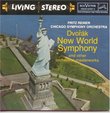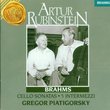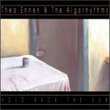| All Artists: Mahler, Rigby, Wigglesworth, Premiere Ensemble Title: Das Lied Von Der Erde Members Wishing: 0 Total Copies: 0 Label: RCA Release Date: 1/10/1995 Genre: Classical Styles: Historical Periods, Modern, 20th, & 21st Century, Symphonies Number of Discs: 1 SwapaCD Credits: 1 Other Editions: Artur Rubinstein - Franck: Prelude, Chorale & Fugue; Bach-Busoni: Chaconne; Liszt: Sonata in B minor UPC: 090266804320 |
Search - Mahler, Rigby, Wigglesworth :: Das Lied Von Der Erde
CD DetailsSimilar CDs
|
CD ReviewsMonumental, majestic, transcendent, powerful, definitive. ronaldbrian | Quezon City, Philippines | 06/02/2006 (5 out of 5 stars) " My jaw drops that I am the first to review this album. I am no musicologist. I don't have any formal training in music-like a lot of us who would consider buying an Artur Rubinstein recording. Hence I listen, react, and review from a more visceral place. My analyses are comparative instead of technical. My languge, emotional rather than specialized. This caveat done, let me just say that this is one of the best recordings I have ever heard in my entire life. For comparison, I have the Evgeny Kissin performance of Franck's Prelude, Chorale & Fugue in cd, the Rosalyn Tureck (the High Priestess of Bach no less) performance of the Bach-Busoni in DVD, and the Yundi Li and Francois Frederic Guy performances of the Liszt Sonata in DVD. None of these performances begin to touch Rubinstein's genius and soul with these pieces. Artur Rubinstein was well in his eighties when he recorded these pieces. He was at the height of his musical humanity/divinity when he read them. Listen and you will agree: every molecule in his being focused on each note that he communed on the keyboard. As for THE Liszt Sonata, a towering work has met its towering match in Rubinstein. Don't rave over the Richter performance unless you've listened to this one. I'm actually surprised people gush over that performance, as well as over the Argerich. I don't have those recordings, but after listening to the first few bars of the piece via Music Sampler, it was apparent to me who the better proponent for the Liszt Sonata was. I don't dispute that that Richter and Argerich are excellent pianists, but I do wish that the reviewers would listen to Rubinstein's profound engagement first before they proclaim another performance as the best. Please, if you love the Liszt sonata do yourself a huge favor and listen to this cd. " Supremely controlled and elegant - maybe a touch too much so Discophage | France | 08/11/2007 (4 out of 5 stars) "This is the reissue with a different cover of Rubinstein plays Liszt Sonata in Bm, Franck Prelude Chorale & Fugue, Bach-Busoni Chacone whose first CD release was in 1987. Its main dish is Rubinstein's 1965 recording of Liszt's b-minor Sonata (originally published on LP with Schubert's Wanderer Fantasy), paired with superb accounts of Franck's Prelude Chorale & Fugue and Busoni's transcription of Bach chaconne, both recorded in 1970 (see my review of the previous entry fore more details).
Liszt wasn't at the core of Rubinstein's repertoire. He did two recordings of the 1st piano concerto (you can find them on Bmg's Rubinstein Collection, Vol. 32 and Rubinstein Collection, Vol. 53), but apparently none of its pendant, the 2nd piano concerto. There is also a CD (Rubinstein Collection, Vol. 31) collecting all his miscellaneous Liszt pieces: Funérailles, Valse oubliée, Mephisto-Waltz, Liebesträume, Consolation 3, two Hungarian Rhapsodies - all mono recordings from the early 50s. Maybe his technique simply wasn't up to the daunting challenges posed by the Etudes d'exécution transcendantes and similar virtuosic works (he never did Chopin's etudes either), or maybe Rubinstein didn't feel attuned to the spirit of Liszt's music. So it is almost surprising to find him tackling Liszt's magnum opus, and one can fear a certain lack of kinship with the lisztian idiom. As it turns out, there is in fact much to admire in Rubinstein's reading. At the beginning, you might find him a bit underpowered, especially if, as myself, you hear this recording immediately after Gilels' live 1961 recording (apparently it cannot be found anymore in its first Chant du Monde CD release, but is now available as Chopin: Sonatas for piano No2; Liszt: Sonata for piano in Bm) or Horowitz' 1977 remake (Liszt: Sonata In B/Ballade No.2/Consolation No.3/Funérailles/Mephisto Waltz No.1). But then there is no lack of power on the return of the dramatic section at 7:02, so maybe it took Rubinstein time to warm up to the piece on that recording day, or more likely he was just holding back in order not to shoot all his bolts at once (something I remarked also with Gilels studio recording done for RCA a few months before this one: Franz Schubert: Sonata in D,D.850, Op.53/Franz Liszt: Sonata in B Minor). Rubinstein shows no technical shortcoming that I can perceive, on the contrary: his octave scales and jumps in the first development section after the slow introduction are played with snap, and the pianist's digital fleetness and delicacy the right-hand filigree of the more lyrical passages is admirable (try 7:50 for instance). Admirable also is his fine and tasteful control of dynamics and his ability to clarify Liszt's complex textures, never blurring the left hand thanks to sparse pedalling. Overall he shows commendable accurateness in his realization of the score and overall doesn't fiddle around with tempos, except in a few spots where, like a few others, he is prone to turning Liszt 4/4 into 3/4 or 3/4 into 6/8 (at 14:55 for instance), or to shorten the value of silences or semi-note - presumably in order to avoid an impression that the music is coming to a standstill: Rubinstein the showman never lurks far, afraid to bore his audience to sleep (or have it burst into applause) if he should let a silence last more than two seconds. He also adds a bar of chords at 19:30. On the other hand, parts of the sonata, and most notably its beginning, sound curiously uninvolved. I commented on Horowitz' 1977 recording that he made the Sonata into a theatre play or an opera - and in all probability one involving Faust, Marguerite and Mephisto. Nothing like that with Rubinstein. His is an "objective" approach, he plays the music and nothing beyond the notes. It is a tasteful reading, maybe a little too much so for Liszt. Whatever you may think of Horowitz' 1977, love it (as I do) or hate it, you can't deny its theatricality and its demonic power. There is also a breath-taking, frenzied vehemence with Gilels in 1961. Nothing like that with Rubinstein. His final "stretto quasi presto" at 22:48 lacks a touch of fire and the kind of feeling of being on the brink of the abyss that Gilels brings to it to it. Rubinstein's interpretation is beautifully controlled and tasteful - and maybe a little too much so: after all, this is Liszt, not Chopin. His superb control is, I feel, both the reading's value and its shortcoming. With Franck's Prelude, Chorale & Fugue and Busoni's reworking of Bach's Chaconne (both recorded in 1970), we get two relatively rare, highly appropriate and superb fillers. This same material has been reissued by RCA in their complete Rubinstein collection, with a few more fillers: Rubinstein Collection, Vol. 68. " |





